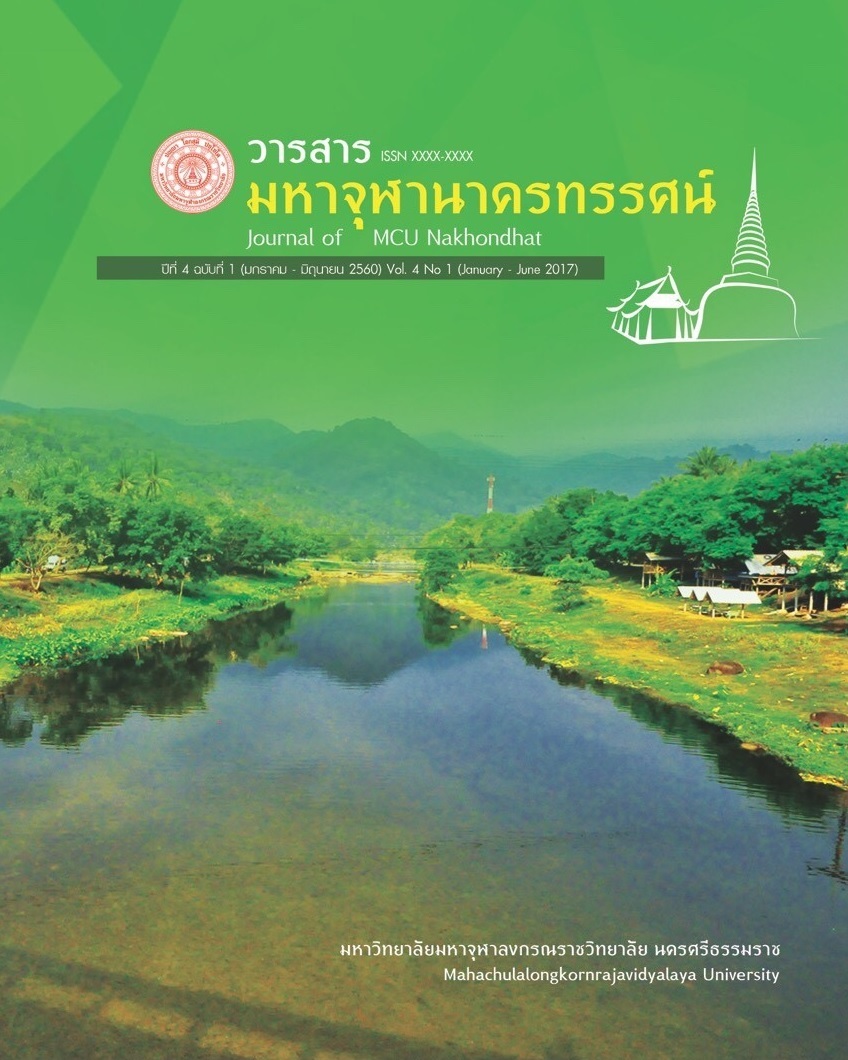AN APPLICATION OF BRAHMAVIHARA DHAMMA PRINCIPLE IN ADMINISTRATION OF SCHOOL ADMINISTRATORS ACCORDING TO TEACHER’S OPINIONS IN THE CHARITY SCHOOL GROUP SONGKHLA PROVINCE.
Main Article Content
Abstract
The objectives of this research were as follows 1). To study an application of Brahmavihara Dhamma principle in administration of school administrators according to teacher ’s opinions in the charity school group, Songkhla province 2) To compare an application of Brahamavihara Dhamma principle in administration of school administrators according to teacher’s opinions in the charity school group, Songkhla province in terms of sexes, ages, degrees of education, monthly incomes and experiences in teaching as differently 3). To study on suggestion for the ways to promote on application of Brahmavihara Dhamma principle in administration of school administrators according to teacher’s opinions in the charity school group, Songkhla province. The populations were composed about 277 persons, sample size by Krejcie and Morgan’s table’s measurement, the samples were about 162 persons, The instrument for data collection was questionnaire, data analysis by package computer program, the statistics were applied as follows; frequency, percentage, arithmetic mean, standard deviation, T-test, one way ANOVA or F-test and to test the difference of arithmetic mean in each pair by LSD method.
The findings were as follows;
1) The teachers in the charity schools group had applied on Brahmavihara Dhamma principle in administration of school administrators by overview in four aspects found that there were at more level when considered in each aspect found that the aspect of Mudhita was the highest mean, followed up the aspect of Metta and the aspect of Upekkha was the lowest mean.
2) The comparative results in application of Brahamavihara Dhamma in administration of school administrators according to teacher’s opinions in the charity school group, Songkhla province found that in terms of experiences in teaching found that there were different as statistically significance at .05 but in terms of sexes, ages, degrees of education and monthly incomes found that there were not different as statistically significance at .05.
3) The suggestion on the ways to promote application of Brahmavihara Dhamma principle in administration of school administrators according to teacher’s opinions, in the charity school group, Songkhla province found that the aspect of the school administrators should be impartial mind, neutrally without prejudice to every subordinator’s teacher.
Article Details
References
พระครูสมุห์อนุกูล อนุวฑฺฒโน (ปานประดิษฐ์) . (2556). ความคิดเห็นของประชาชนที่มีต่อการนำหลักพรหมวิหาร 4 ไปใช้ในการบริหารงานขององค์การบริหารส่วนตำบลม่วงงาม อำเภอสิงหนคร จังหวัดสงขลา. นครศรีธรรมราช: โรงพิมพ์มหาวิทยาลัยมหาจุฬาลงกรณราชวิทยาลัย.
พระอดิศักดิ์ สารโท (เตือนสันเทียะ). (2557). การบริหารงานบุคคลตามหลักพรหมวิหาร 4 โรงเรียนประถมศึกษาอำเภอวังน้อย จังหวัดพระนครศรีอยุธยา (การบริหารการศึกษา). กรุงเทพมหานคร: โรงพิมพ์มหาจุฬาลงกรณราชวิทยาลัย.
มหาวิทยาลัยมหาจุฬาลงกรณาชวิทยาลัย. (2539). พระไตรปิฎกภาษาไทย ฉบับมหาจุฬาลงกรณราชวิทยาลัย.กรุงเทพมหานคร: โรงพิมพ์มหาวิทยาลัยมหาจุฬาลงกรณาชวิทยาลัย.
วีระ ขุนอาจ. (2551). ความเห็นของครูเกี่ยวกับการนำหลักพรหมวิหาร 4 ไปใช้ในการบริหารงานของผู้บริหารโรงเรียนในศูนย์เครือข่ายอุบลรัตน์ อำเภออุบลรัตน์ จังหวัดขอนแก่น. นครศรีธรรมราช: โรงพิมพ์มหาวิทยาลัยมหามกุฏราชวิทยาลัย.
ส่งศรี ชมภูวงศ์. (2553). ระเบียบวิธีวิจัยทางสังคมศาสตร์. นครศรีธรรมราช: โรงพิมพ์มหาวิทยาลัยมหามกุฏราชวิทยาลัย.


